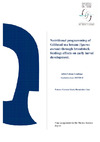Please use this identifier to cite or link to this item:
https://accedacris.ulpgc.es/jspui/handle/10553/75044
| Title: | Nutritional programming of Gilthead sea bream (Sparus aurata) through broodstock feeding: effects on early larval development | Authors: | Cabana Gandiaga, Julián | Director: | Hernández Cruz, Carmen María | UNESCO Clasification: | 251092 Acuicultura marina | Keywords: | Gilthead sea bream larvae Nutrition |
Issue Date: | 2018 | Abstract: | The state of the breeding fish, the degree of stress to which they may be subjected, in addition to their feeding, even during the spawning period, constitute very important parameters for the viability of their descendants, influencing considerably in the quality of their eggs and the future health of these. In this way, the nutritional programming represents a very effective tool to increase the chances of obtaining a good quality spawn through the control of feeding in the breeding fish. The objective of this study was to determine the effects produced by the broodstock diet on the quality of the spawn and on the growth and survival in the species Sparus aurata. Four treatments were formulated resulting from a combination of two diets, one with a high content of long-chain polyunsaturated fatty acids (LC-PUFA) (fish oil) and the other with a low content of this fatty acid (rapeseed oil); and two types of reprductors divided into a some with a high expression of delta 6 desaturase (fads2) and others with a low expression of fads2. Treatment 1 (T1) was represented by specimens with high expression of fads2 and a high percentage of vegetable oil (VO) in their diet; treatment 2 (T2), reproducers with low fads2 expression and a high VO diet content; treatment 3 (T3), reproductive fish with a high expression of fads2 and a low content of VO in diet and finally, treatment 4 (T4), with reproductive organisms with a low expression of fads2 and a low content in the diet of VO. The results of this experiment showed that the diet with high contents in fish oil (FO) and with high values of long chain – polyunsaturated fatty acid (n-3 LC-PUFA), increased the growth, resistance to stress and survival of the larvae. On the other hand, diets formulated with high amounts of VO, which indicates a minimum contribution of n-3 LC-PUFA, obtained the highest mortality. | Department: | Departamento de Biología | Faculty: | Facultad de Ciencias del Mar | Degree: | Grado en Ciencias del Mar | URI: | https://accedacris.ulpgc.es/handle/10553/75044 |
| Appears in Collections: | Trabajo final de grado Restringido ULPGC |
En el caso de que no encuentre el documento puede ser debido a que el centro o las/os autoras/es no autorizan su publicación. Si tiene verdadero interés en el contenido del mismo, puede dirigirse al director/a o directores/as del trabajo cuyos datos encontrará más arriba.
Show full item recordPage view(s)
62
checked on Jan 11, 2026
Download(s)
8
checked on Jan 11, 2026
Google ScholarTM
Check
Share
Export metadata
Items in accedaCRIS are protected by copyright, with all rights reserved, unless otherwise indicated.
